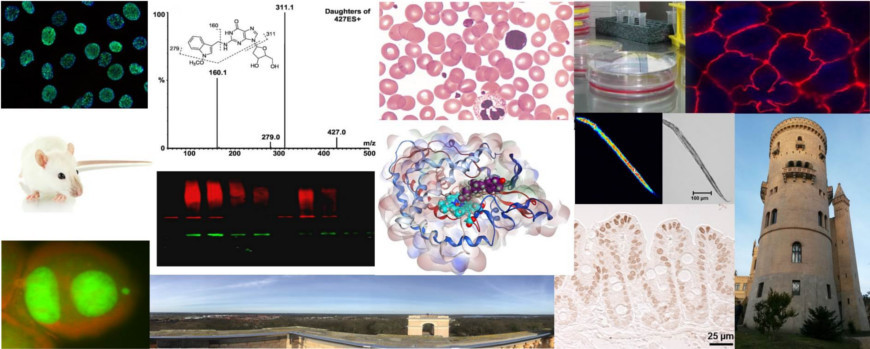Toxicology | Master

Toxicology seeks to understand the nature and mechanism of adverse effects of toxicants such as those found e.g. in industry, in the household, in food, in medicine and those that occur naturally in the environment. The English-language master’s degree in toxicology at the University of Potsdam prepares you to participate in this field with a particular emphasis to cellular and molecular mechanisms of toxicity and to risk assessment.
| Name | Toxicology |
| Degree | Master of Science |
| Standard period of study | 4 semesters |
| Credit points | 120 |
| Language of instruction | English |
| Start of study (1st semester) | Winter semester |
| Campus | Potsdam-Rehbrücke |
| Gebühren & Beiträge | Semestergebühren und -beiträge: ja Studiengebühren: nein |
- PROGRAM FLYER (PDF 249KB)
Program Content
The research-oriented master’s degree program in toxicology conveys comprehensive knowledge about toxicants including their impact on living organisms. You will gain a profound understanding in general toxicology including pharmacology, physiology and pathophysiology, organ toxicology, pathological anatomy as well as histopathology. Furthermore, you will develop a methodological toolkit that enables you to explore and analyze these phenomena. Thereby the knowledge about chemistry, biochemistry and medicine is deepened as well as your practical competences will be extended in analytical chemistry, in vitro toxicology and in vivo toxicology (e.g. experimental animal models in toxicology). Since working as a toxicologist also implicates a juristically dimension you will gain substantial knowledge in national and international legislative and regulatory processes.
Course Objectives and Future Career Options
As a graduate of the master’s degree in toxicology, you will be able to plan and work independently in the field of toxicological science and risk assessment. You will be able to identify subject-specific problems, find appropriate methods to address them, and present the results of your work in an appropriate form.
Career prospects for our graduates include scientific institutions and universities, chemical/ pharmaceutical/food industry, and governmental authorities. Your analytical training and solid English skills will qualify you for numerous, national and internationally oriented professions.
Prerequisites for Master’s Program of Study
Important prerequisites for the master’s degree program include a solid foundation in chemistry, biochemistry, food chemistry, nutritional science, biology, pharmacy, medicine or veterinary medicine and a deep interest in toxicology. To enter the master’s degree program you must have obtained a Bachelor’s degree (180 CP), or another comparable academic degree, in any undergraduate subject relevant to this graduate program. You must provide documentation of at least 60 credit points in medicine or natural sciences with strong relevance to this master’s degree program.
Because this degree program is taught in English, we expect good English skills that correspond at least to the C1 level of the Common European Reference Framework for Languages.
You can learn more about the subject-specific admission requirements in the respective admission regulations.
Program Structure
The Master’s Program of study for the Master Toxicology is hold within four semesters with an extend of 120 credit points (CP). In the following table information about weighting of the respective modules are shown. For additional information, please consult the subject-specific Degree Regulations or the Departmental Advisory Office.
| Modules | Credit points |
|---|---|
| Principles of toxicology | 12 CP |
| Pharmacology, physiology and pathophysiology | 6 CP |
| Tissue-specific toxicity and histopathology | 6 CP |
| Principles in experimental animal toxicity testing | 6 CP |
| Advanced toxicology | 9 CP |
| Experimental toxicology | 15 CP |
| Human toxicology | 6 CP |
| Applied toxicology, regulatory toxicology and risk assessment | 15 CP |
| Practical toxicology – industry/authority/scientific institution (preferably abroad) | 15 CP |
| Master's Thesis | 30 CP |
| Total | 120 CP |
Advantages at a Glance
The region Berlin/Brandenburg is one of Germany’s emerging centers of toxicology. This master’s degree at the University of Potsdam is operated in close cooperation with the German Institute of Human Nutrition (DifE) and the Federal Institute for Risk Assessment (BfR). There is a broad range of toxicological topics covered in ongoing research projects at all participating institutes and you are involved in current toxicological research questions from the very beginning. Our close relations to international groups in the field of toxicology allow you to establish contacts with leading international research institutions, companies and authorities. Developing these contacts at such an early stage will prove invaluable for your future career.
The University of Potsdam has taken into account the actual conditions among students and introduced the option for part-time study into several degree programs. This also pertains to Toxicology. For more information, go to part-time studies at the University of Potsdam.
Application
Have you decided to study the English-language master’s degree in Toxicology at the University of Potsdam? Then you should take the next step and get more information about the current application and enrollment procedures at the application website.
Kontakt
Department of Food Chemistry
Dr. Franziska Ebert | Departmental Advising
Campus Bergholz-Rehbrücke
Room 0.130
This description is based in part on information from the Discipline-Specific Regulations for Study and Examinations for the Master’s Program in Toxicology at the University of Potsdam at the University of Potsdam dated January 20, 2016 (AmBek Nr. 6/16, S. 552).
